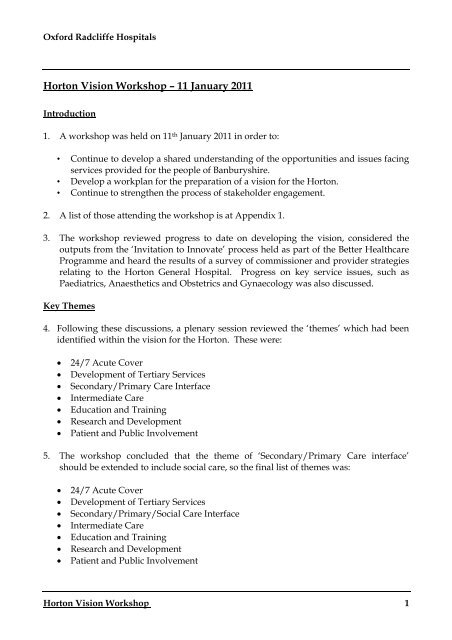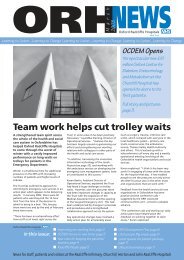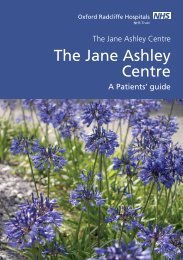Horton Vision Workshop - Oxford Radcliffe Hospitals NHS Trust
Horton Vision Workshop - Oxford Radcliffe Hospitals NHS Trust
Horton Vision Workshop - Oxford Radcliffe Hospitals NHS Trust
You also want an ePaper? Increase the reach of your titles
YUMPU automatically turns print PDFs into web optimized ePapers that Google loves.
<strong>Oxford</strong> <strong>Radcliffe</strong> <strong>Hospitals</strong><br />
<strong>Horton</strong> <strong>Vision</strong> <strong>Workshop</strong> – 11 January 2011<br />
Introduction<br />
1. A workshop was held on 11 th January 2011 in order to:<br />
• Continue to develop a shared understanding of the opportunities and issues facing<br />
services provided for the people of Banburyshire.<br />
• Develop a workplan for the preparation of a vision for the <strong>Horton</strong>.<br />
• Continue to strengthen the process of stakeholder engagement.<br />
2. A list of those attending the workshop is at Appendix 1.<br />
3. The workshop reviewed progress to date on developing the vision, considered the<br />
outputs from the ‘Invitation to Innovate’ process held as part of the Better Healthcare<br />
Programme and heard the results of a survey of commissioner and provider strategies<br />
relating to the <strong>Horton</strong> General Hospital. Progress on key service issues, such as<br />
Paediatrics, Anaesthetics and Obstetrics and Gynaecology was also discussed.<br />
Key Themes<br />
4. Following these discussions, a plenary session reviewed the ‘themes’ which had been<br />
identified within the vision for the <strong>Horton</strong>. These were:<br />
� 24/7 Acute Cover<br />
� Development of Tertiary Services<br />
� Secondary/Primary Care Interface<br />
� Intermediate Care<br />
� Education and Training<br />
� Research and Development<br />
� Patient and Public Involvement<br />
5. The workshop concluded that the theme of ‘Secondary/Primary Care interface’<br />
should be extended to include social care, so the final list of themes was:<br />
� 24/7 Acute Cover<br />
� Development of Tertiary Services<br />
� Secondary/Primary/Social Care Interface<br />
� Intermediate Care<br />
� Education and Training<br />
� Research and Development<br />
� Patient and Public Involvement<br />
<strong>Horton</strong> <strong>Vision</strong> <strong>Workshop</strong> 1
<strong>Oxford</strong> <strong>Radcliffe</strong> <strong>Hospitals</strong><br />
6. The workshop then split into 4 working groups to consider the themes and to identify<br />
the top 3 priorities within each theme, and the key people who should be involved in<br />
the development of the theme. The results of that exercise were as follows:<br />
Group 1<br />
24/7 Acute Cover<br />
Development of Tertiary Services<br />
The top 3 priorities/issues within the themes are:<br />
24/7 Acute Cover<br />
� ‘Hub’ of skills and expertise 24/7. Medicine/anaesthetics – support other<br />
specialties.<br />
� Work with GP colleagues (not in silos)<br />
� Holding bay for investigations<br />
� Need enhanced access to diagnostics<br />
� Back door – getting people out, in order to get more in, reduced delayed transfers<br />
Development of Tertiary Services<br />
� Identify those most required/needed (recent GP survey)<br />
� Surgical specialties outpatient clinics at HGH could be expanded further<br />
The key people to involve in the development of these themes are:<br />
24/7 Acute Cover<br />
� Hospital Consultants – hearts and minds, working differently<br />
o Medicine<br />
o Other specialities<br />
o Diagnostics<br />
� GPs/PML/community services/Social care<br />
Development of Tertiary Services<br />
� GPs<br />
� Consultants<br />
� Patients/public – ask they what they want, eg dialysis<br />
Other Points to Note:<br />
� Historic training structures are no longer relevant or sustainable<br />
� Identifying patients suitable for <strong>Horton</strong><br />
� Quality – get senior opinion early<br />
<strong>Horton</strong> <strong>Vision</strong> <strong>Workshop</strong> 2
<strong>Oxford</strong> <strong>Radcliffe</strong> <strong>Hospitals</strong><br />
� How do you deal with out of hours specialty-specific problems? – e.g. access to<br />
specialist option and on-call from home.<br />
� GPs ‘holding tank’<br />
� Link with 1 o /2 o care group<br />
Group 2<br />
Secondary/Primary/Social Care Interface<br />
Intermediate Care<br />
The top 3 priorities/issues within the themes are:<br />
Secondary/Primary care interface (including interface with social services)<br />
� Communication between primary and secondary care and joined up thinking about<br />
services<br />
� Implementation of good pathways both in and out of hospital. Too often GPs<br />
experience such difficulties in getting suitable community care and support for<br />
patients that they end up admitting them to hospital as the only safe option for<br />
care. Equally need to make sure that support is available for after discharge.<br />
� Cross-county boundary issues with social services (ie getting in hospital social<br />
services for South Northants and Warwickshire)<br />
Other issues:<br />
� The management of boundaries with organisations.<br />
� Policy differences between different PCTs and social services were highlighted. It<br />
was suggested that having a Care Co-ordinator post who would be aware of the<br />
different policies and people to negotiate with might improve efficiency and be<br />
better from the patient’s point of view.<br />
� Timings of discharges (Friday afternoons are not a good time to set up care<br />
packages and make sure district nurses are fully informed).<br />
� Communications with district nurses generally.<br />
� Lots of good work has been done on good pathways but is it all being<br />
implemented?<br />
� Education of junior doctors about what services are available in the community<br />
(some overestimate, some underestimate!). Ongoing work needed in terms of<br />
education about primary care for junior doctors.<br />
� Financial pressures on social care in Northamptonshire and <strong>Oxford</strong>shire are already<br />
having serious implications for primary and secondary care.<br />
� There is apparently £123million of DH money for managing people in the<br />
community in innovative ways (eg movement sensors in patient’s homes). Are we<br />
bidding for this money?<br />
� Who is suitable for early discharge? Should there be more joined up decisions<br />
between GPs/hospital doctors and social services? Ward rounds together?<br />
� Tertiary services: GP commissioning will make it easier to reflect patients’ desires<br />
from South Northants to get their tertiary services in <strong>Oxford</strong>shire.<br />
<strong>Horton</strong> <strong>Vision</strong> <strong>Workshop</strong> 3
<strong>Oxford</strong> <strong>Radcliffe</strong> <strong>Hospitals</strong><br />
Top 3 Priorities<br />
Intermediate Care<br />
� Communication between secondary and primary care<br />
� Who provides the medical care? GPs reluctant to take on further burden.<br />
� How do you define intermediate care – how much nursing care?<br />
� Identifying patients for early discharge to intermediate care<br />
Other issues:<br />
� Step-down beds for children. There is no intermediate care for children who will<br />
not get the care they need at home to recover but who are no longer in need of<br />
hospital care.<br />
� Administrative advantages to having a community hospital in an acute setting. But<br />
is it to the patient’s advantage? Is there a temptation to discharge patients from<br />
acute to intermediate care sooner than might otherwise have done?<br />
� TTOs issue in discharge of patients<br />
The key people to involve in the development of these themes are:<br />
Secondary Primary Care Interface<br />
GPs (cross-county)<br />
Charities/voluntary organisations involved in providing care<br />
Health visitors<br />
Practice nurses<br />
District nurses<br />
County council social services<br />
Ward nurses<br />
Social services in the hospitals<br />
Care agencies/nursing homes<br />
Patients<br />
Parents<br />
Children’s Centres<br />
Care agencies/nursing homes<br />
Junior doctors<br />
Gerontologists<br />
Intermediate Care<br />
Patients<br />
Occupational therapists<br />
Physiotherapists<br />
District nurses<br />
GPs<br />
<strong>Horton</strong> <strong>Vision</strong> <strong>Workshop</strong> 4
<strong>Oxford</strong> <strong>Radcliffe</strong> <strong>Hospitals</strong><br />
Other Points to Note:<br />
� Prioritisation through patient public involvement<br />
� Learning from others (not re-inventing the wheel)<br />
� South Northants/Cherwell working together. Cross-boundary working can be<br />
done!<br />
� Is this the care I would want for a member of my family?<br />
� Opportunities to improve things during the move to GP commissioning<br />
� Communication between primary and secondary care and joined up thinking about<br />
services<br />
� Implementation of good pathways both in and out of hospital. Too often GPs<br />
experience such difficulties in getting suitable community care and support for<br />
patients that they end up admitting them to hospital as the only safe option for<br />
care. Equally need to make sure that support is available for after discharge.<br />
� Cross-county boundary issues with social services (ie getting in hospital social<br />
services for South Northants and Warwickshire)<br />
Group 3<br />
Education and Training<br />
Research and Development<br />
The top 3 priorities/issues within the themes are:<br />
Education and Training<br />
� Teaching those involved in care (eg nursing homes) to develop their skills – integration<br />
of social and acute education<br />
� Understand why doctors trained/specialism versus holistic and physiological<br />
� <strong>Horton</strong> great place for training (postgrad) doctors working with community rather<br />
than absolute numbers of patients – developing doctoring skills – and social dimension<br />
� How can training link to developing services at <strong>Horton</strong> (define what is needed)<br />
� Define function of services and links to training<br />
� Insight into community needs and agenda<br />
� Integration of health education across whole community services (health, social,<br />
community, educational)<br />
Research and Development<br />
� Components of Richard Leaman paper (stable population rather than more transient<br />
population) – could this create a different environment for research. (Evolved from<br />
small rural society to relatively large conurbation with stable populations) (140k –<br />
180k). Unique resource for education and research opportunity.<br />
� Research about healthcare delivery – small but geographically tight population –<br />
integrating community/primary/hospital<br />
<strong>Horton</strong> <strong>Vision</strong> <strong>Workshop</strong> 5
<strong>Oxford</strong> <strong>Radcliffe</strong> <strong>Hospitals</strong><br />
� Maintain GP profile into acute services – nature of <strong>Horton</strong><br />
� Research activity done in <strong>Oxford</strong>/can be done in <strong>Horton</strong>.<br />
The key people to involve in the development of these themes are:<br />
Education and Training<br />
� Healthcare professionals<br />
� Community<br />
� Public/primary sector providers<br />
� Public – social/educational<br />
� Private – care homes<br />
� Commissioners of healthcare education<br />
Research and Development<br />
� University (include department of primary care)<br />
� Large charitable initiatives – other bodies funding research<br />
� BRC/NIHR<br />
� Links to Abingdon pilot<br />
Group 4<br />
Patient and Public Involvement<br />
The top 3 priorities/issues within the theme are:<br />
� Communication<br />
� language for different audiences<br />
� Change in culture<br />
� PPI needs to be in the context of the health economy<br />
The key people to involve in the development of this theme are:<br />
Provider<br />
Public<br />
Commissioner (NOCC) Patient<br />
<strong>Horton</strong> <strong>Vision</strong> <strong>Workshop</strong> 6
<strong>Oxford</strong> <strong>Radcliffe</strong> <strong>Hospitals</strong><br />
� Existing CPF – as a platform for engagement<br />
Other Points to Note:<br />
� Harness community energy<br />
� Community map of who are key leaders in the community<br />
� Cherwell District Council/South Northants = glue to ‘hold’ it all together<br />
� Clean slate with new paediatricians to embrace the ethos of PPI<br />
Next Steps<br />
7. The ‘next steps’ identified in the process of developing a vision for the <strong>Horton</strong> General<br />
Hospital were:<br />
• Development of a work programme.<br />
• Integration of the work programme into the refresh of the <strong>Trust</strong>’s clinical services<br />
strategy, Integrated Business Plan and Long Term Financial Model.<br />
• Continued stakeholder involvement.<br />
8. The timetable for this work envisages that an initial framework strategy will be<br />
produced in March/April and a draft Integrated Business Plan /Long Term Financial<br />
Model will be developed in July/August, as part of the process of becoming a<br />
Foundation <strong>Trust</strong>.<br />
Mr Andrew Stevens<br />
Director of Planning and Information<br />
<strong>Horton</strong> <strong>Vision</strong> <strong>Workshop</strong> 7
<strong>Oxford</strong> <strong>Radcliffe</strong> <strong>Hospitals</strong><br />
Appendix 1<br />
Sir Jonathan Michael<br />
Paul Brennan<br />
Professor Ted Baker<br />
Geoff Salt<br />
Susan Brown<br />
Dr Tony Ellis<br />
Dr Graham Walker<br />
Andrew Stevens<br />
Mr Stephen Kennedy<br />
Gwen Hunt<br />
Karen Hin<br />
Cariad Hazard<br />
Chris Ringwood<br />
Councillor George Parish<br />
Dr Charles Perrott<br />
Emma Clancy<br />
Dr John Harrison<br />
Councillor Rosie Herring<br />
Dr Peter Fisher<br />
Dr Gwyneth Rogers<br />
Ian Davies<br />
Julia Cartwright<br />
Tony Baldry MP<br />
Dr John Walton<br />
Dr Hugh Gillies<br />
Ally Green<br />
Sumit Biswas<br />
Anita Higham<br />
Calvin Bell<br />
Rob and Jenny Jones<br />
Dr Judith Wright<br />
Ken Hawtin<br />
Jill Edge<br />
<strong>Workshop</strong> Attendees<br />
<strong>Horton</strong> <strong>Vision</strong> <strong>Workshop</strong> 8
<strong>Oxford</strong> <strong>Radcliffe</strong> <strong>Hospitals</strong><br />
Don Wilkes<br />
Val Strange for Kate Barker<br />
Councillor Gillian Roache<br />
Lynda Atkins (facilitator)<br />
<strong>Horton</strong> <strong>Vision</strong> <strong>Workshop</strong> 9





